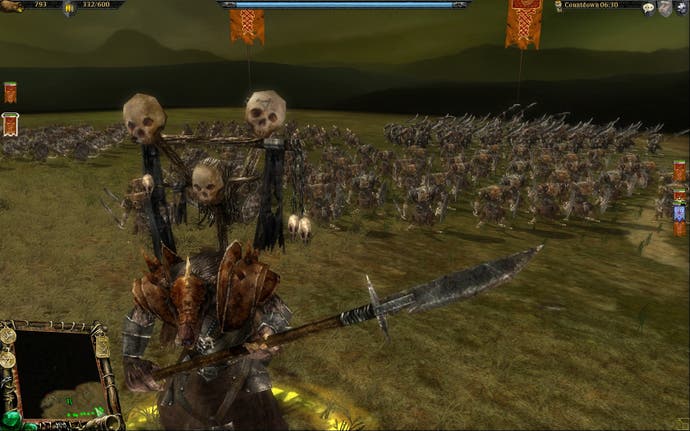Warhammer: Mark of Chaos
Total War-hammer
It's a slightly different, and much improved, matter in multiplayer, where the rules of engagement and army sizes are tailored more by every participant in advance, so Warhammer thus creeps closer to its tabletop origins. There's no unconvincing pretence of the game being about anything more than the battles here, and it feels more robust for it. The same in-battle animation and intangibility problems persist of course, but at least the playing field is level. There's also a greater emphasis on grabbing capture points, which in turn call in reinforcements, meaning battles aren't solely resolved by whoever flanks first wins. There's a strong chance that Mark of Chaos has a good future of online clashes with carefully customised armies minutely tailored by long-time Warhammer players ahead of it. Big, big faults remain though, and it's very difficult to envisage any amount of patching resolving them sufficiently to give the game a universal appeal.
Despite all this criticism, Warhammer is saved from ever being an actual failure by its setting. This isn't just knights and swordsmen and archers and ohgodhistoryistedioussometimes. It's particularly dark fantasy, full of incredible monsters, insanely powerful heroes and sinister magic, but in an admirably straight military approach rather than the usual RTS silliness of chopping wood to build a goblin. And there is some very mild diversity to be had, in the form of RPG-esque Heroes to level up, pick powers and collect items for, creating much more sense of attachment to your army and some interesting ways to turn the tide. That said, an awkward interface means Heroes can be very tricky to manage in the heat of massed battle, and their optional one-on-one 'duels' are a somewhat laughable bout of waiting for special abilities to recharge and potion-guzzling.
Best of all, though, are Skaven. Now, one of the standard tactics of That Guy On The Internet and his 300,000 identical clones, the one who takes even the slightest criticism of something they like or praise of something they dislike as a signal to launch a personal attack on the reviewer, is to scream 'biased!' as soon as possible. Apparently, they've identified some sort of insane deep-seated prejudice against the game/console/band/film/breed of terrier in question on said writer's part. Standard response to That Guy is something like 'I'm a professional critic. Carrying vendettas against or predispositions for specific games is both not in my nature and will stop me from getting work, so every one is approached with an entirely open mind. Though I may think differently if I hear that a developer of something I'm reviewing has previously beaten up my mother.' But, I really like rats. I keep some as pets, in fact. That makes the inclusion of ratmen race the Skaven a theoretically very enticing element of this game for me. How can I possibly approach Warhammer objectively when I can murder a bunch of pantywaist High Elves by setting a slavering horde of my favourite animal (albeit shown here as grotesque and two-legged) onto them?

Well, rather easily. Though pretty damned cool, Skaven really aren't even remotely cute, and in fact I've lately been eyeing my own rats with a degree of mistrust now I've seen just how monstrous they'd be if they suddenly evolved into sword-wielding bipedal form. Still, magic rats, gigantic rats and tunnelling stealth rats are bags of fun, and make Medieval II's men on horses look really boring by comparison. Though others may prefer the more traditional fantasy factions, Skaven are a compellingly different race to play as from the strategy norm, and are a sign of just how much the interestingness of the Warhammer world manages to overcome some really deep-seated flaws in the game. The four races, essentially the Warhammer takes on humans, elves, demons and beasts (with optional mercenary support from Dwarfs or Orcs & Goblins) hardly present a brand new scenario, but the dark, gritty twists Games Workshop puts upon each makes them consistently interesting. More specifically, the use of magic, plus special abilities for certain units, means the game shifts from its initial Total War-clone feel into being something palpably more its own.
I'm dancing around the point a little. That's because there is going to be an inevitable split between tabletop players absolutely delighted with the best-ever visual recreation of their game of choice (though possibly also apoplectic about some of the liberties taken with Warhammer rules) and general strategy gamers nonplussed as to why they'd possibly want to play this messy, sometimes broken-feeling thing over the hugely superior (but less aesthetically inventive) Medieval II: Total War. Or, for that matter, even over Dawn of War, which, though a very different type of game, does killing Games Workshop creations very well indeed. Obviously, what with Eurogamer being a non-specialist publication, I'm marking more for the latter than the former, but they too will get more than a few kicks out of the visual and thematic ideas in Mark of Chaos. They are, though, unlikely to stick with it for long. For the love of God though, don't fork out £50 on the collector's edition. Well, unless you really like blank cardboard.
